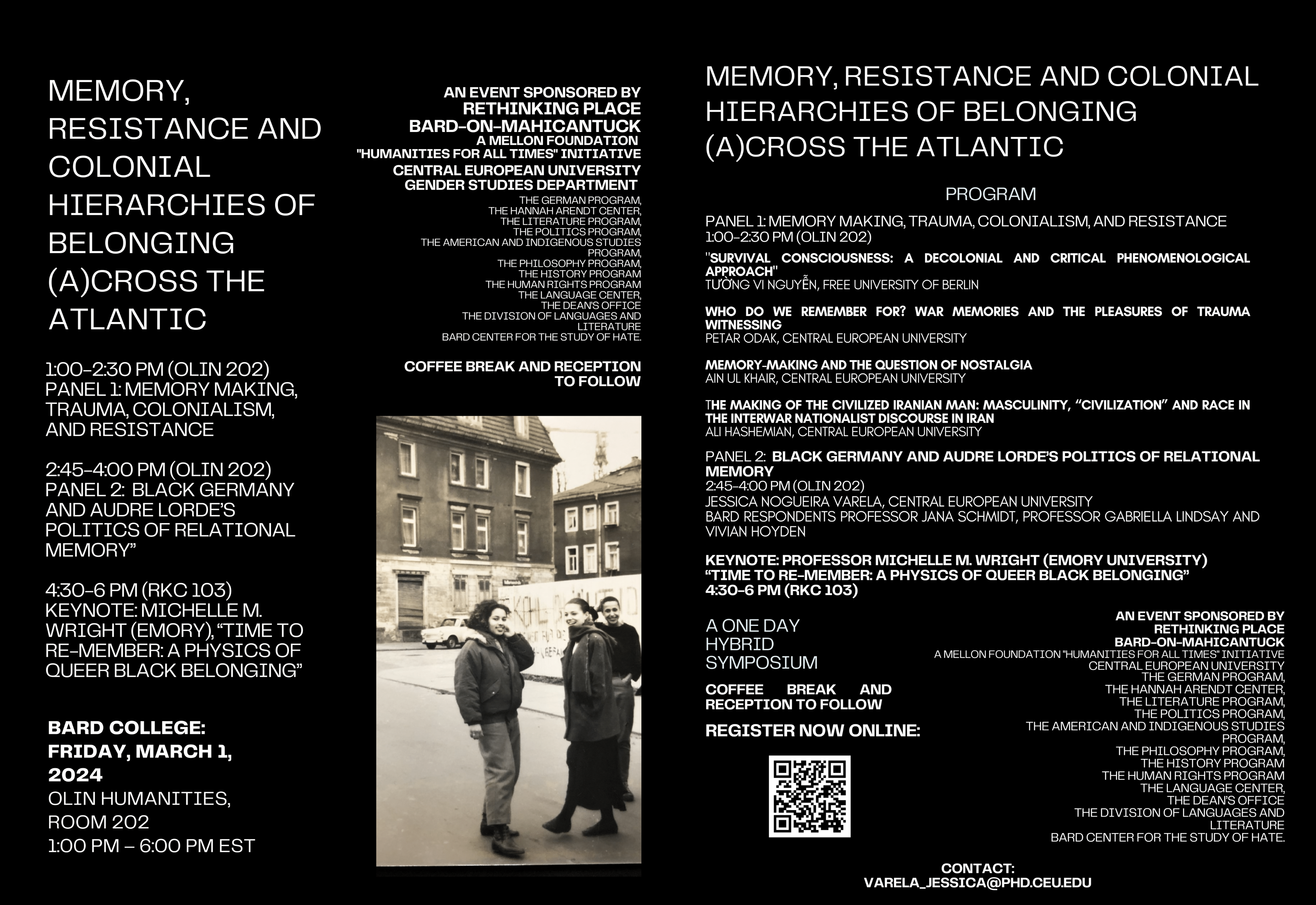
Click on the image to see the full schedule and RSVP!
German Studies Program Presents
Memory, Resistance, and Colonial Hierarchies of Belonging (A)cross the Atlantic
Friday, March 1, 2024
Olin 202 & RKC 103
1:00 pm – 6:00 pm EST/GMT-5
In their 1992 open letter to Chancellor Helmut Kohl, African American writers Audre Lorde and Gloria I. Joseph protested a recent wave of deadly attacks on refugees in East Germany by connecting it to tacit violence against people of color and the “fundamental questions of racism, anti-Semitism, and xenophobia […] within the German psyche that have not been publicly examined and addressed in the last 50 years.” Instead of easily buying into the commemoration ritual of German Reunification, Lorde and Joseph measured the success of German memory culture by its effect on their lives, asking “Why has the dismantling of the Berlin Wall meant that we now feel less and less safe as Black Women visitors [...], lest we be insulted or attacked?”1:00 pm – 6:00 pm EST/GMT-5
Today, their question reverberates against the backdrop of multiple “refugee crises” and the rise of right-wing extremisms across Europe, with German’s AfD party growing in popularity. This one-day symposium builds on Lorde and Joseph’s protest letter to explore transnational connections and narratives of resistance in Germany and across the Atlantic. We seek to explore how marginalized groups have politically and historically advocated for justice by drawing parallels of remembrance against forgetting across different cultures, spaces, languages, bodies and times. By realizing parallels across multiple geopolitical histories of migrant activists, feminists, workers, Europeans of colour, Sinti and Roma populations and refugees we want to generate interdisciplinary discussions on the uses of memory as resistance.
We invite various artistic, academic and activist perspectives to provide new perspectives that broaden the clusters of Memory, Resistance and Colonial Hierarchies of Belonging. While our focus is on Germany, we welcome contributions from other contexts that comparatively address how Western colonial, imperial, transnational, and transatlantic memories are tied and translated to other regions and contexts.
This event is co-sponsored by: Rethinking Place Bard-On-Mahicantuck, A Mellon Foundation "Humanities For All Times" Initiative, Central European University, Gender Studies Department, The Hannah Arendt Center, The Literature Program, The Politics Program, The American And Indigenous Studies Program, The Philosophy Program, The History Program, The Human Rights Program, The Language Center, The Dean's Office, The Division Of Languages And Literature, and Bard Center For The Study Of Hate.
Schedule:
1:00-2:30 PM (Olin 202)Panel 1: Memory Making, Trauma, Colonialism, and Resistance
Tường Vi Nguyễn (Freie Universität Berlin) "Survival Consciousness: A Decolonial and Critical Phenomenological Approach"
Ain Ul Khair (CEU), “Memory-Making and the Question of Nostalgia”
Peter Odak (CEU), tbd
Ali Hashemian (CEU), “The Making of the Civilized Iranian Man: Masculinity, ‘Civilization’ and Race in the Interwar Nationalist Discourse in Iran”
2:45-4:00 PM (Olin 202)
Panel 2: Jessica Varela (CEU), “Gendering Blackness, Migration, Coloniality: Una Marson, Claudia Jones, and Audre Lorde in the UK and Germany” and Bard respondents Gabriella Lindsay, Jana Schmidt, Vivian Hoyden
4:30-6 PM (RCK 103) Keynote: Michelle M. Wright (Emory), “Time to Re-Member: A Physics of Queer Black Belonging”
For more information, call 845-758-6822, or e-mail [email protected].
Time: 1:00 pm – 6:00 pm EST/GMT-5
Location: Olin 202 & RKC 103